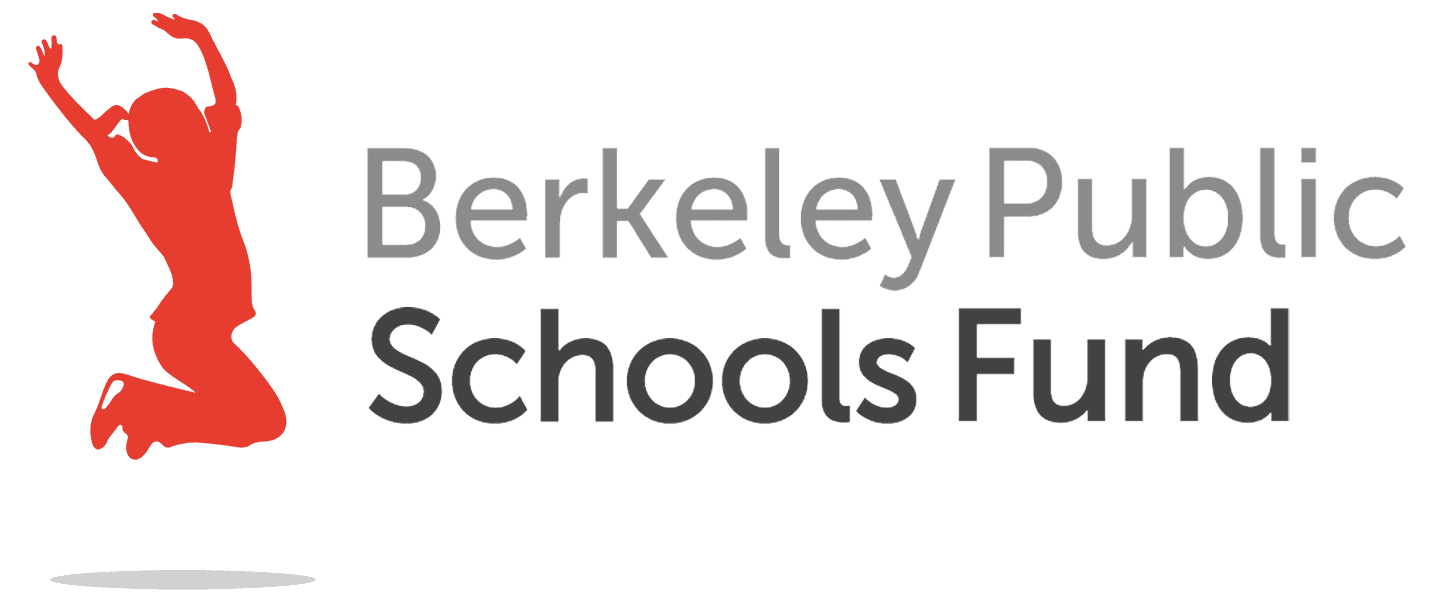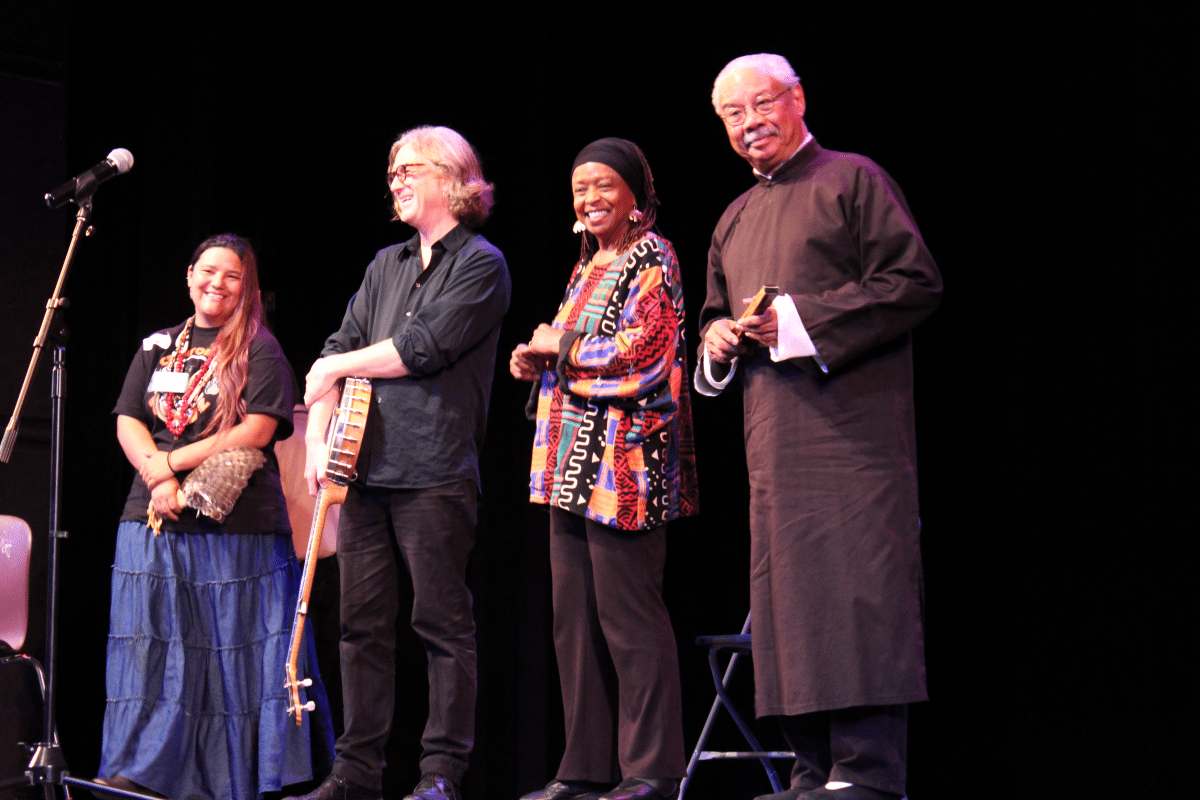 I sat in Berkeley High’s Little Theater waiting for the Storytelling Festival to begin, listening to student conversations happening around me. Some quietly tackled math homework, others sang in Spanish, a few more chatted about their crew team. Soon one conversation melted into another, the crew kids picking up on basic Spanish phrases, exclaiming, “You’re teaching me!” Casual references to politics and diversity hinted at a deeper comfort with these huge issues. And everyone was cheerful, excited to be participating in culturally diverse storytelling. I had expected grumbling and eye rolling, but I was pleasantly surprised. These kids know what’s up!
I sat in Berkeley High’s Little Theater waiting for the Storytelling Festival to begin, listening to student conversations happening around me. Some quietly tackled math homework, others sang in Spanish, a few more chatted about their crew team. Soon one conversation melted into another, the crew kids picking up on basic Spanish phrases, exclaiming, “You’re teaching me!” Casual references to politics and diversity hinted at a deeper comfort with these huge issues. And everyone was cheerful, excited to be participating in culturally diverse storytelling. I had expected grumbling and eye rolling, but I was pleasantly surprised. These kids know what’s up!
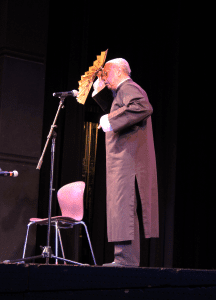 The enthusiasm carried over as teacher Alan Miller approached the stage to chat a bit more about the program (greeted with cheers!). Mr. Miller received a Schools Fund Classroom Grant to bring in three storytellers representing different traditions, styles, and temperaments. “As all good storytellers know, listening is one of the most important parts of a good story. So please participate by listening.”
The enthusiasm carried over as teacher Alan Miller approached the stage to chat a bit more about the program (greeted with cheers!). Mr. Miller received a Schools Fund Classroom Grant to bring in three storytellers representing different traditions, styles, and temperaments. “As all good storytellers know, listening is one of the most important parts of a good story. So please participate by listening.”
Writer, musician, and historian Charlie Chin began the Festival. Dressed in a simple black robe and brandishing a Chinese fan, Chin told a traditional Chinese folktale about feuding families, proclamations from the Emperor, and a bit of magic. During the Q&A following the event, Chin explained, “it doesn’t matter if a story is true. What matters is what the story is trying to tell you.”
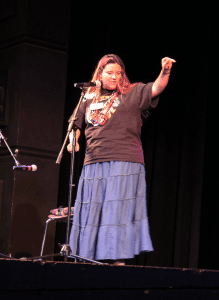 Next, Costanoan Ohlone and Chuman Native American Kanyon Sayers-Roods shared music and stories from her Native Community. Students particularly loved Sayers-Roods’s lesson on how her community expresses appreciation. Rather than clapping, a loud “OH!” suffices to express enthusiasm, something students practiced for the remainder of the event.
Next, Costanoan Ohlone and Chuman Native American Kanyon Sayers-Roods shared music and stories from her Native Community. Students particularly loved Sayers-Roods’s lesson on how her community expresses appreciation. Rather than clapping, a loud “OH!” suffices to express enthusiasm, something students practiced for the remainder of the event.
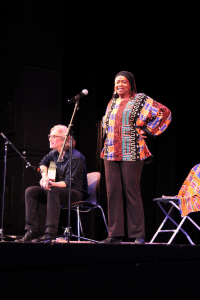 The very engaging Diane Ferlatte and her musical sidekick Erik Pearson closed the show with an energetic, playful re-telling of Aesop’s “The Donkey in the Lion’s Skin,” which teaches us to embrace who we are. Ferlatte brilliantly morphed the story into one about her bi-racial adopted son, who struggled in high school to be “black enough.” He tried so hard to be something he wasn’t, he was kicked out of four high schools in Oakland. After finally graduating from a school in Maine, her son began to embrace his authentic identity. He is now a social worker, helping other struggling young people. The move from Aesop to contemporary race issues was beautiful and flawless, and students visibly loved it.
The very engaging Diane Ferlatte and her musical sidekick Erik Pearson closed the show with an energetic, playful re-telling of Aesop’s “The Donkey in the Lion’s Skin,” which teaches us to embrace who we are. Ferlatte brilliantly morphed the story into one about her bi-racial adopted son, who struggled in high school to be “black enough.” He tried so hard to be something he wasn’t, he was kicked out of four high schools in Oakland. After finally graduating from a school in Maine, her son began to embrace his authentic identity. He is now a social worker, helping other struggling young people. The move from Aesop to contemporary race issues was beautiful and flawless, and students visibly loved it.
Storytelling roots us in history, in a “once upon a time” before texting and computers and the barrier of a screen. Each storyteller emphasized the importance of this ancient, social form of sharing our lives and heritage with each other. Sure students are texting and Snapchatting their lives with alarming speed, but reflecting on what I overheard before the Festival, I don’t think good old-fashioned conversation is going anywhere.
